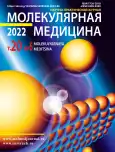Cycline dependent kinase 4 decreased level in the population of Ki-67-negative melanoma cells
- Авторлар: Lapkina E.Z.1, Esimbekova A.R.1, Zinchenko I.S.1, Ruksha T.G.1
-
Мекемелер:
- Prof. V.F. Voino–Yasenetsky Krasnoyarsk State Medical University
- Шығарылым: Том 20, № 6 (2022)
- Беттер: 39-43
- Бөлім: Original research
- URL: https://bakhtiniada.ru/1728-2918/article/view/143969
- DOI: https://doi.org/10.29296/24999490-2022-06-06
- ID: 143969
Дәйексөз келтіру
Аннотация
Introduction. A transition of proliferating cancer cells to a G0 phase of a cell cycle considered to be implicated in cancer cell drug resistance.
The aim of the study. A separation of G0-positive melanoma B16 cells fraction that correspond to resting followed by cyclin dependent kinase 4 and cyclin dependent kinase inhibitor B1 expression estimation in these cells was the aim of the study.
Methods. Melanoma B16 cells were subjected to incubation with alkylating agent dacarbazine to induce a transition of cancer cells in a G0 phase of a cell cycle. Immunocytochemical assay was applied to visualize Ki-67-negative, Go-positive melanoma cells. Fluorescent sorting was used to separate an isolated population resting cells with subsequent cyclin dependent kinase 4 and cyclin dependent kinase inhibitor B1 expression evaluation.
Results. Dacarbazine induced the percentage of Ki-67-negative melanoma B16 cells that correspond to G0-positive cells. Fluorescent sorting application revealed 26% of resting cells among all melanoma cells population. Resting melanoma cells exhibited diminished levels of cyclin dependent kinase 4.
Conclusion. Alkylating agent dacarbazine induces the percentage of resting cancer cells that may be an additional mechanism of cancer cell drug resistance. Cell sorting allowas to separate of resting cancer cells population. Further study for these cell phenotype characterization is important for developing new strategies of targeting quiescent, G0-positive cancer cells.
Негізгі сөздер
Толық мәтін
##article.viewOnOriginalSite##Авторлар туралы
Ekaterina Lapkina
Prof. V.F. Voino–Yasenetsky Krasnoyarsk State Medical University
Хат алмасуға жауапты Автор.
Email: e.z.lapkina@mail.ru
ORCID iD: 0000-0002-7226-9565
associated professor of the Department of pharmacy. Candidate of biological sciences
Ресей, Partizan Zheleznyak, 1, Krasnoyarsk, Krasnoyarsk Territory, 660022Alexandra Esimbekova
Prof. V.F. Voino–Yasenetsky Krasnoyarsk State Medical University
Email: aleksandra.esimbekova.96@mail.ru
ORCID iD: 0000-0001-6363-5941
PhD student of the Department of pathological physiology
Ресей, Partizan Zheleznyak, 1, Krasnoyarsk, Krasnoyarsk Territory, 660022Ivan Zinchenko
Prof. V.F. Voino–Yasenetsky Krasnoyarsk State Medical University
Email: Zinchenko.Ivan.003@gmail.com
ORCID iD: 0000-0001-7085-6304
laboratory assistant of the Department of pathological physiology
Ресей, Partizan Zheleznyak, 1, Krasnoyarsk, Krasnoyarsk Territory, 660022Tatiana Ruksha
Prof. V.F. Voino–Yasenetsky Krasnoyarsk State Medical University
Email: tatyana_ruksha@mail.ru
ORCID iD: 0000-0001-8142-4283
head of pathophysiology department. Doctor of medical sciences, Professor
Ресей, Partizan Zheleznyak, 1, Krasnoyarsk, Krasnoyarsk Territory, 660022Әдебиет тізімі
Қосымша файлдар











